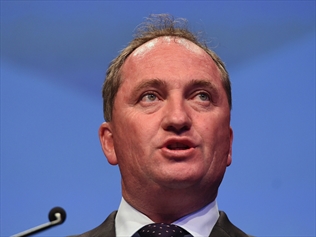
Agriculture Minister Barnaby Joyce (Pic) has defended Mathias Cormann in the budget debate. Source: AAP
THE politics of economic and budgetary matters can be as dry as toast.
SO Agriculture Minister Barnaby Joyce for one was pleased to see his government colleague Mathias Cormann bring some colourful language to the debate.
The finance minister last week described Opposition Leader Bill Shorten as an “economic girly man” for opposing the budget, a term Labor said was an insult to young women. Opposition employment spokesman Brendan O’Connor went further, saying Senator Cormann doesn’t have to sound like a “dickhead” if he wants to make a point. But Mr Joyce, renowned for his own colourful barbs, believes you can over-analyse such things. “You’re either boring as bat-poo … but as soon as someone is themselves, they say `shock, horror, you can’t have that – go back to being boring’,” he told reporters in Canberra on Monday. Senator Cormann was dealing with the more serious business of the coalition’s long time commitment of selling health insurer Medibank Private on Monday. The sale is now estimated to raise $5.5 billion, which will be used to fund its asset recycling initiative. That provides states and territories an incentive to sell off assets and use those monies to re-invest in productivity enhancing infrastructure, like roads. Australian retail investors will be able to apply for shares from October 28 at an indicative price range of $1.55 to $2.00 per share. “A price cap for retail investors means that Australian residents who choose to apply for shares will not pay any more than $2.00 per share, even if the final price is set above the indicative range,” Senator Cormann said in a statement. This budget initiative aside, at least $18 billion in government savings otherwise remain unlegislated. The independent Parliamentary Budget Officer Phil Bowen has also warned there was a “reasonably uncertain international outlook” which would affect revenues. “That is not helped by international conflicts and of course concerns about the Ebola epidemic,” Mr Bowen told a Senate estimates hearing in Canberra. He said there is a risk that commodity prices could fall faster that predicted and have a negative impact in the short-term on the budget. “I’m not crying wolf or trying to inject a flavour of panic – I am simply talking about the need for sensible budget management which does include building a sensible buffer against such shocks,” he said.
